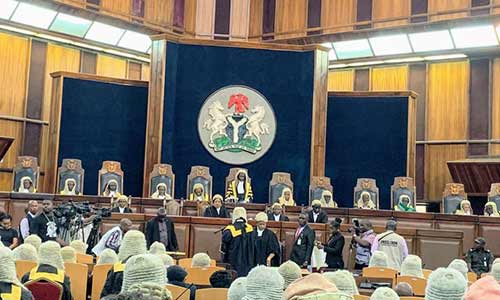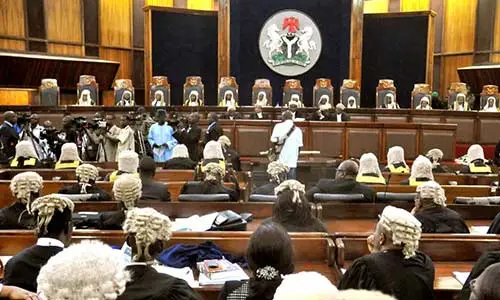SUPREME COURT JUDGEMENTS 03/10/2023
Fair Hearing’s Insufficiency To Categorise Ground Of Appeal As Ground Of Law

In the Supreme Court of Nigeria
Holden at Abuja
On Friday, the 7th day of July, 2023
Before Their Lordships
Kudirat Motonmori Olatokunbo Kekere-Ekun
Uwani Musa Abba Aji
Helen Moronkeji Ogunwumiju
Tijjani Abubakar
Emmanuel Akomaye Agim
Justices, Supreme Court
SC/438/2015
Between
- MR ABDUL RAHMON ADISA ADAGUN
- MRS AMUDALAT OLANREWAJU OYELOLA APPELLANTS
- MR MAROOF MORAKINYO ADAGUN
- ABDUL HAFEEZ OLUWASEYI ADAGUN
And
- ABDUL RAHMAN SATUMARI
- THE PERMANENT SECRETARY, BUREAU OF
LANDS AND SURVEY (BORNO STATE) RESPONDENTS
- HON. ATTORNEY-GENERAL (BORNO STATE)
- BORNO STATE GOVERNMENT
(Lead Judgement delivered by Honourable Tijjani Abubakar, JSC)
Facts
The Appellant (now late and substituted by his Executors), while he was a Judge of the High Court of Borno State Judiciary, applied for, and was granted a Right of Occupancy over a parcel of land along Lagos Street, Maiduguri, in 1981. The right was granted with express and implied covenants for payment of yearly rents by the Appellant and to erect building on the land worth N100,000 within two years of the grant of the Right of Occupancy. The parcel of land was subsequently registered and covered by Certificate of Occupancy Number BO/7505, dated 11th May, 1989, with the condition that future annual rents payable is advance on 1st January each year, without demand, direct to the land section of the Ministry of Lands and Survey, and fulfilment of other conditions, including developing the land within a time frame.
The Appellant took possession of the land, paid fees, annual rents, bought blocks and trips of sand to develop the said plot of land. He later transferred his service to Lagos State Judiciary in 1992, and retired in 1999 as a Chief Judge. However, the Appellant stopped paying rents to the 2nd – 4th Respondent since 2000. Consequently, the Appellant’s Certificate of Occupancy No. BO/7505 was revoked in the year 2005, pursuant to Section 28(5)(a) & (b) of the Lands Use Act, 1978.
Meanwhile, while the Appellant was away, a certain Mr Felix Olufabiya was in charge of the land who eventually informed him of adverse developments on the plot by one Mallam Jubril Satumari, who was the 1st Respondent in this appeal (Substituted by Abdulrahman Satumari). It was discovered that the 2nd – 4th Respondent had revoked the Certificate of Occupancy No. BO/7505 on 24/1/2002 addressed to the Appellant through his former address, “High Court of Justice, Borno State”. The same plot was allocated to the 1st Respondent, who was issued with Certificate of Occupancy No. BO/154176. The Appellant felt aggrieved by the action of the 2nd – 4th Respondent, revoking his right over the land and the Certificate of Occupancy. He commenced an action at the High Court of Justice, Maiduguri via Writ of Summons, setting out his claims. On the 30th day of April, 2007, the trial court dismissed the Appellant’s claims and entered judgement in favour of the Respondents. Dissatisfied, the Appellants appealed to the Court of Appeal. The Appellate Court affirmed the decision of the trial court, and dismissed the appeal. The Appellant further appealed to the Supreme Court, on seven grounds.
At the Supreme Court, the Respondents filed their respective Preliminary Objections challenging the competence of the appeal, on the basis that the Grounds of Appeal are of mixed law and facts, and the Appellants did not seek the leave of the Supreme Court or the Court of Appeal before filing same.
Issue for Determination
Whether all the Grounds of Appeal which are of mixed law and facts or grounds of facts, filed by the Appellants without seeking and obtaining leave of court before filing, are competent to activate the jurisdiction of the court to determine the appeal.
Arguments
Arguing the Preliminary Objection, counsel for the 1st Respondent contented that the Grounds of Appeal contained in the Appellants’ Notice of Appeal are incompetent, because the said grounds are either grounds of mixed law and facts or grounds of facts, and no prior leave of court was sought for and obtained before filing the said grounds of appeal, thereby rendering the grounds of appeal incompetent to activate the jurisdiction of the court and deserves to be struck out – OFORKIRE v MADUIKE (2003) 5 NWLR (Pt. 812) 166. Responding to the submission of the 1st Respondent, counsel for the Appellants argued that the Preliminary Objection of the 1st Respondent is incompetent because the 1st Respondent failed to accompany the objection with a written address, and the written address of 1st November, 2017 would not be sufficient to cater for the objection filed on the 9th day of January, 2018; counsel submitted that permitting so would amount to putting the cart before the horse, and that would not be allowed by the court. He contended further that the Preliminary Objection must be dismissed, because it is speculative and an afterthought. Counsel posited that the Grounds of Appeal are competent. Relying on the decision of Supreme Court in BRITTANIA-U {NIG) LTD v SEPLAT PET DEV CO LTD (2016) 4 NWLR (Pt. 1503) 541 at 592, he argued that a Respondent who challenges an Appellant’s Grounds of Appeal, has a duty to satisfy the court that the grounds of appeal belong to a classification different from the one the Appellant assigned to it. Counsel stated that the 1st Respondent failed to demonstrate that the Grounds of Appeal are of mixed law and facts, and urged the court to dismiss the Preliminary Objection.
Counsel for the 2nd, 3rd and 4th Respondent, arguing their Preliminary Objection, contented that the appeal number contained on the Notice of Appeal filed by the Appellants to the Supreme Court, was different from the appeal number at the Court of Appeal. He argued that the appeal determined by the lower court was CA/J/209/2012, but the Appellant chose to appeal against CA/J/209C/2012. Counsel relied on the case of KENTE v ISHAKU (2017) 70 NSCQR 1 at 26, to emphasise that the right of appeal under Section 233 of the Constitution of the Federal Republic of Nigeria, 1999 (as amended) cannot arise under a Notice of Appeal directed against a non-existent decision of a court of law, and that such appeal is an exercise in abuse of court of process. Counsel submitted further that the Grounds of Appeal filed by the Appellants are either grounds of mixed law and facts or grounds of facts simpliciter, and no leave of the lower court or the Supreme Court was sought for and obtained by the Appellants before filling the appeal. He argued that the appeal is incompetent, as it is incapable of activating the jurisdiction of the court – ONYEME OKE & ORS v AMOS EKE ORS (1982) 12 SC 218. Refuting the submissions, counsel for the Appellants argued that the Preliminary Objection should fail ab initio, because the 2nd, 3rd, and 4th Respondent did not file and or issue a Notice of Preliminary Objection, and the grounds upon which the notice of the objection is premised. On the issue of the appeal being against non-existent appeal, counsel posited that even on the face of it, the objection is at best technical, most frivolous, amounts to an abuse of court of process and a complete waste of precious time and scarce litigation resources. Counsel submitted further that all grounds 1-7 of the Notice and Grounds of Appeal and the particulars of error, fall within grounds of law simpliciter. Counsel urged the court to dismiss the Preliminary Objection, and the appeal be heard and determined on the merit.
Court’s Ruling and Rationale
Deciding on the issue raised by the Respondents, the Apex Court scrutinised both the Grounds of Appeal and the particulars filed by the Appellants, to determine whether the grounds are of law or mixed law and facts. The Supreme Court noted that issues of mixed law and facts, facts and law alone are very delicate, and intricate; they entail complex mixture in most cases making it difficult to navigate through the muddle and untie. Though it is observed that some Appellants craft their Grounds of Appeal and assign to them inappropriate nomenclature “Grounds of Law” just to circumvent the requirements of Section 233(2) and (3) of the Constitution of the Federal Republic of Nigeria, 1999 (as amended) on the mandatory requirement for leave to appeal where the grounds of appeal are of mixed law and facts, the court must do a community reading of the Grounds of Appeal and their particulars of error, to unveil the status of the Ground of Appeal.
In ground one of the appeal, the issue of fair hearing was raised because the lower court only addressed issues 1 and 2 in the appeal, and abandoned issues 3 and 4. On this point, Their Lordships held that merely raising the issue of fair hearing, is not sufficient to categorise a ground of appeal as ground of law without more. In determining the real nature of a ground of appeal, the court is required to consider the ground complained of along with its particulars to determine whether the ground is of law alone, facts or mixed law and facts. The Supreme Court reiterated its position on the point that the appellate court always has the right to adopt or alter the issues for determination submitted by the parties, and doing so does not infringe upon an Appellant’s right of fair hearing by the court who has re-formulated the issues for determination.
On grounds 2,3,4,5,6,7 the Apex Court found them to be grounds of mixed law and facts, as the grounds are challenging the decision of the lower court, where the court held that the Appellant had not proved his claim. It is clear from reading the grounds and their respective particulars of error, that they are grounds of mixed law and facts. The Supreme Court held further that the Appellant cannot make his way to the Apex Court and file an appeal on grounds of mixed law and facts without obtaining prior leave of court, as required under Section 233(3) of the Constitution. The Grounds of Appeal as filed are deficient and incompetent; therefore, they are liable to be struck out. The court relied on its earlier decision in AI MAJIR v JALBAIT VENTURES NIG. LTD & ANOR. (2021) 1-2 SC (Pt. 2), where it held thus – “Where leave first sought and obtained is the sine qua non, under Section 233(2) and (3) of the Constitution of the Federal Republic of Nigeria, as amended, for a valid or competent appeal, unless the leave was first sought and granted to the Appellant to appeal, any appeal lodged or filed in defiance of the said mandatory provisions, will be void and a nullity ab initio …”.
Having resolved the Preliminary Objection against the Appellants, their Lordships unanimously struck out the appeal.
Appeal Struck Out.
Representation
Adewunmi R. Fatunde, Esq. with A. Umoso, Esq. for the Appellants.
M.E. Oru, SAN, with N. Adanu, O. Egelamba, A. Moses and O. Adaramola, for the 1st Respondent.
K.S. Lawan, Esq, with U.I. Ujah, G.O. Elias and N.U. Usman, for the 2nd, 3rd and 4th Respondent.



